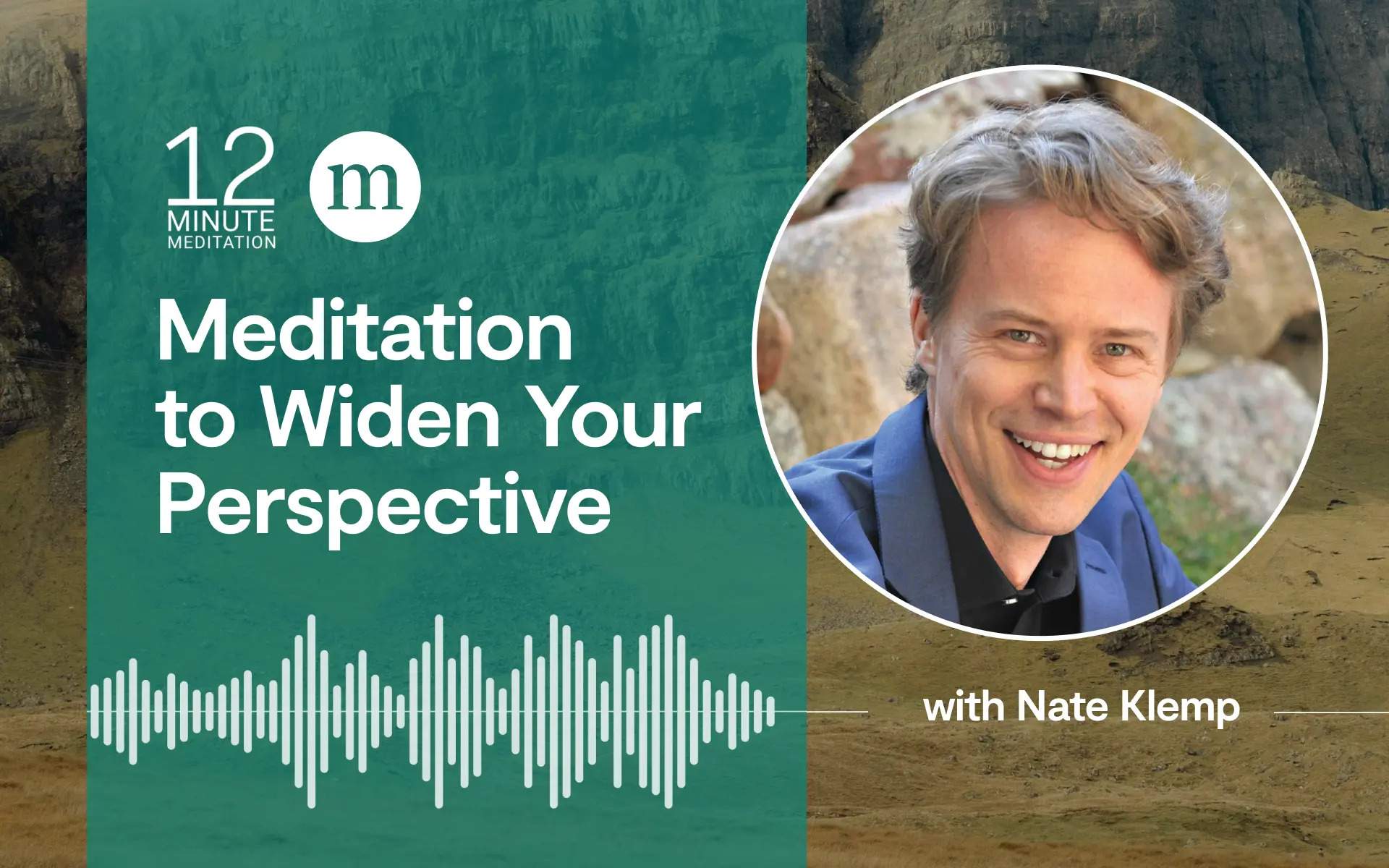In this episode of the podcast, Editor-in-Chief Barry Boyce sits down with Stephanie Domet, editor at Mindful, to talk about “rudeness” from a mindful point of view.
They explore the direct line between mindfulness and manners and explore how we can wake up to the moment.
Point of View Podcast Episode 8
Mind(ful) Your Manners
Stephanie Domet: Barry, what made you want to write about rudeness?
Barry Boyce: Well as a matter of fact, I have been to several conferences and mindfulness retreats, and I started to notice that the level of impoliteness was as much in evidence there as it was in society at large, so I started to think, what’s wrong with this picture?
Stephanie Domet: What surprised you about that?
Barry Boyce: Well I think the emphasis in mindfulness practice is to pay a lot of attention to what’s happening in your mind and body and around you and with other people, and so it’s just kind of a striking contrast.
Barry Boyce: I want to preface this all by saying that you know the interesting thing about talking about any kind of mindfulness principle is that nobody is an expert, so I don’t want to hold myself up as the paragon of perfect mindfulness because you set yourself up for a fall. So I’m just another guy trying to make his way through the world with a little bit of mindfulness.
Stephanie Domet: So, I love that “paragon of perfect mindfulness,” we’re gonna change your title to that in the masthead. What kinds of things did you observe at conferences or elsewhere in society that made you think that there might be a connection to be drawn between a mindfulness practice and rude behavior.
Barry Boyce: Well I think one of the main things you know something that I guess in the military they call it situational awareness, which means you know the space that your body is taking up in and how you were interacting with your immediate environment. So it involves things like, if some other people are in conversation, how do you engage in that? I found myself being frequently interrupted and I mean at one point I was listening intently to a speaker and somebody grabbed my shoulder and was shaking it and saying, “Hey, you’re from Mindful right, don’t you…?” And you know, I wanted to say what’s wrong with this picture here, you’re interrupting me in the middle of a talk on mindfulness to pitch me a story about mindfulness.
Mindfulness isn’t self-absorption
Stephanie Domet: Now given your earlier assertion that you are not a paragon of perfect mindfulness, is this behavior that you’ve observed in yourself?
Barry Boyce:Oh yes, certainly I can. I mean particularly now around habits with devices, you know when the cell phones were first coming out I thought, I’m never going to have one of those things. And sure enough, three quarters of my life and work are run out of my cell phone now and I can have a tendency to be looking at it and blocking other, people ignoring other people. That kind of thing has a lot to do with just not getting so self-absorbed.
Stephanie Domet: Yeah, self-absorbed, let’s talk about that because that can be a side effect of a practice that is putting you kind of in touch with yourself and what’s going on in your internal landscape. So what do you want to say about self-absorption as it relates to mindfulness.
Barry Boyce: Yeah that’s one of the things that I wanted to draw out there because I’ve definitely noticed it myself that with mindfulness practice there’s the notion that you’re kind of working on yourself. I have some habits I want to change or I want to figure out why I seemed to make things more painful than they need to be. And you know there’s all sorts of reasons that we want to pay more attention and figure out why things are turning out the way they are. However, that kind of project can slowly but surely morph into this big deal of the project of me. How am I going to make me a better me? And in the midst of that you’re not really paying attention to what’s going on immediately, you’re paying attention to building up this idea of you, the better you, so people notice it and they think, oh that’s what mindfulness meditation people are like there. They’re all caught up in themselves. They think that they’re a big deal.
Stephanie Domet: It’s a bit of a tragedy isn’t it.
Barry Boyce: Yes, well I don’t know about tragedy but it certainly, certainly not good for the brand, so to speak. It’s a bit like how let’s say, certain yoga practitioners ostentatiously display their yoga mat that they’re carrying or you know the technical yoga clothes, it’s sending a message that I’m wrapped up in this thing that I’m doing and isn’t it isn’t it precious and isn’t important.
Stephanie Domet: So then what—I’m not gonna say a better option necessarily, but what’s another option for somebody who wants to be mindful and well-mannered?
Barry Boyce:Well I think the thing that I try to remember is to allow myself to be interrupted in the sense of, allow my own absorption and my trip to be interrupted. I was walking through an art gallery with my daughter and my wife about a month ago, and this was a really precious time. I don’t get to see my daughter all that often and we were having a great experience together and I got a text from a friend and I just couldn’t help myself when the ding went off. I had to stop in the middle of doing everything, and look at what he had to say. It was funny and then we had an exchange, and before you know it I’m just standing there blocking the aisle in the art gallery and my wife and daughter have moved on. So my wife gives me a look at that point and it’s that look that I needed to pay attention, to allow it to interrupt where I was going.
If somebody says “excuse me,” that can be a little wakeup call to come back to the moment.
Barry Boyce: So if somebody says “excuse me,” that can be a little wakeup call to come back to the moment, I think that’s that’s the main thing, that there’s constantly stimuli in the regular world that wake us up to the moment and allow us to come back there. I think of when I put my hand on a door knob as I’m about to enter some place I was taught to have that be kind of a reminder that I’m about to enter this next room, to actually use the physical sensation to alert me to where I am.
Stephanie Domet: Because when we’re sitting, when we’re meditating, we use the breath as the anchor as you once told me, and as probably everybody listening to this already knows it’s always there. It’s a convenient anchor but what you’re saying is we there are lots of other things that we could be using, there are lots of other opportunities to sort of come back to the moment.
Barry Boyce: We do breath meditation because if you’re breathing you’re alive so the breath is always going to be there, it’s rhythmic, it’s reliable. So if you’re doing formal meditation practice and you want to choose something that is reliably going to be there, you can’t beat the breath. That’s the best. But the notion isn’t that we’re making a big deal out of the breath, when you aren’t doing formal meditation you’re doing meditation in action meditation out in the world. And the point of noticing might be somebody’s facial expression, that tells you, Oh I’ve been talking too long, and then you can respond to that. It may be somebody’s facial expression or maybe their body language is conveying something like they’re in pain. And so you might slow down and try to empathise a little bit. It’s the habit of coming back to the breath, can become a habit of coming back to all sorts of things,.
Stephanie Domet: Tuning into to that environment, tuning into other people and how we are with them.
Barry Boyce: Yeah, precisely. And I think we’re since we’re probably about manners, you know we’re really we are talking about tuning in to other people. It’s interesting that one of the reasons that we get caught up in ourselves is that we give a lot of reinforcement for being able to control things, if you think about all the little habits you have in your life that are necessary to get through the day. So you tie your shoes, you have total control over that. Putting your clothes, on buttoning your shirt, putting on a cap, putting food in your mouth. Opening the door, driving, walking. So in your immediate environment you have all this control.
With mindfulness we try to get beyond that zone of control … so that we can dance with things a bit more. So that we can respond to what’s coming into our world that we can’t control.
But then when other people get involved you don’t have control. But the habits of trying to control, continue. So therefore, with mindfulness we try to get beyond that zone of control as we get into mindfulness a little farther, so that we can dance with things a bit more. So that we can respond to what’s coming into our world that we can’t control. I can’t control how somebody is going to be, so they may not fit into my plan. And that’s the ultimate in manners or kindness that allowing somebody the space to be, so you know that person that grabbed me and interrupted my listening to a talk, they had a plan that they were executing but that plan didn’t take into account where I was at. And that’s the essence of rudeness right there.
Following “the campsite rule” for life
Stephanie Domet: You write in your column about the natural flow that we can tune into, you write, “When we click it feels good, when we don’t it’s awkward and even allowing it to be awkward is part of being mindful.” Can you talk a little more about that.
Barry Boyce: I think the example I was using was you know, in conversation for example you know you’re at a party or a social occasion of some kind and you feel like you know there’s a natural flow to the conversation, and then somebody else comes in to that conversation and that becomes kind of awkward. Being mindful at that point is a bit like what I was just talking about, is that recognizing what you can’t control and you also can’t control your reactions to a new situation. So that’s where awkwardness comes in. And you know, being okay with that is a part of being able to relax in the world, and when you’re relaxed in the world you make less damage.
Stephanie Domet: You make less damage.
Barry Boyce: Yeah, well this is old fashioned but I think it’s a boy scout motto. Boys scouts, girl scouts, girl guides—to leave a place in better shape than you found it.
Stephanie Domet: Right, the campsite rule.
Barry Boyce: The campsite rule, yes, exactly. So I think that’s a good rule for life. That we’re really talking, when we’re talking about rudeness and manners, we’re talking about the effect that you have on the world, in noticing that you know it could even be that noticing how a mood that you’re in might affect other people, you know. Have you ever had that experience like in an office setting where somebody is in a particular kind of mood and you can you can almost cut it. It’s that tangible? It’s worth taking responsibility for those kinds of things, that you know if you’re having that kind of effect, or creating that kind of tension, you might think about maybe I need to go for a walk and you know let this air clear, you know you want to do less harm. And there are, you know, mindfulness can help you to pay attention to all sorts of levels of harm and including leaving people that feeling like they’re not being paid attention to, they’re not being listened to, they’re not being given the space. You know even the example I give often about the strange thing that happens at elevators that people will crowd around an elevator or a subway door, the door opens and the people on the elevator or in the subway need to get out. But there’s no room for them to get out, because you haven’t given them the space. So it’s a kind of a nice little dance in life when the people waiting for the door can leave open space, the other people come out, the new space opens up and the new people go in. And there’s a kind of an elegance to that. And being mindful has a certain elegance to it in that way, graciousness.
Barry Boyce: You know, I used to work for this guy. One of my first jobs, I worked for an old man from Hungary who had a little dress shop and I used to sweep up for him. Paul Steinbock, Mr. Paul. And Mr. Paul, whenever you would go into his shop when I would show up for work, he would always take a moment and say “Mr. Barry, how are you today? How are you doing?” And he would wait and leave pauses to for you to respond. You felt noticed and there was a moment of two people spending time together. It wasn’t rushed, and he was extremely graceful and everything that he did. And I think that that’s just an aspect of natural mindfulness. So if we actually take up formal mindfulness, we shouldn’t be so self-absorbed that we lose sight of the possibility of having that kind of grace.
Stephanie Domet: Had you began your formal mindfulness practice at that point, did you recognize that as mindfulness?
Barry Boyce: It’s interesting I reckon I hadn’t quite yet, but I recognized it in retrospect and I later on wrote about Mr. Paul, because I actually went back and visited him when he was retired and older because I had great admiration for that kind of elegance and grace, from just a very ordinary man who just owned a dress shop in a small town. He was not anything special, but he was, I might say, he was a paragon of grace and elegance and kindness,.
Stephanie Domet: That really draws a direct line between being mindful and and not being rude. Like that’s a direct line that you’ve drawn.
We think that if we focus more on ourselves then we’re going to get better, and in fact in the end we discover that we don’t need quite so much focus on ourselves at all.
Barry Boyce: Yeah, I think maybe maybe grace and gracefulness gets at the point, grace and gracefulness and ease. That’s mindfulness. Not getting caught up in yourself and you know, we kind of, that’s a trap. We think that if we focus more on ourselves then we’re going to get better, and in fact in the end we discover that we don’t need quite so much focus on ourselves at all.
Stephanie Domet: So what kind of challenge would you wish to tell our listeners regarding this as they, as they go about their day?
Barry Boyce: Well I think that same challenge that I keep trying to issue to myself is to listen to people better. I mean you just talked about our listeners and I think that’s a good, good reminder that listening we might even say with your whole body, so that you’re really noticing how people are and perhaps the effect that you’re having or that you could have. So I think that’s the challenge in terms of this topic of today is to listen as well as you can.
Stephanie Domet: Anything else on your mind today?
Barry Boyce: There was. I don’t know that I can reconstruct it. My plane was delayed and I got in at 4:00 in the morning. It may be affecting that.
Stephanie Domet: How’d it go with your pants this morning?
Barry Boyce:Yeah. No they went on backwards that didn’t that didn’t work out that well.
Stephanie Domet: Well thank you for this, Barry Boyce. I am a newly inspired. I was electrified by the idea of listening with my whole body. So I’m pretty sure I can chew on that for for the next couple of months until we meet again.
Barry Boyce: Well, thanks. I enjoyed it.
Stephanie Domet: This has been mindful point of view podcast with Barry Boyce. If you want to talk to us about what you heard on the podcast, or if you have a question for us, you can drop us a line at mindful@mindful.org. If you liked what you heard consider sharing us with a friend. If you really liked what you heard consider leaving us a review on iTunes. We appreciate it. Thank you. I’m Stephanie Domet. Till next time, listen with your whole body.








